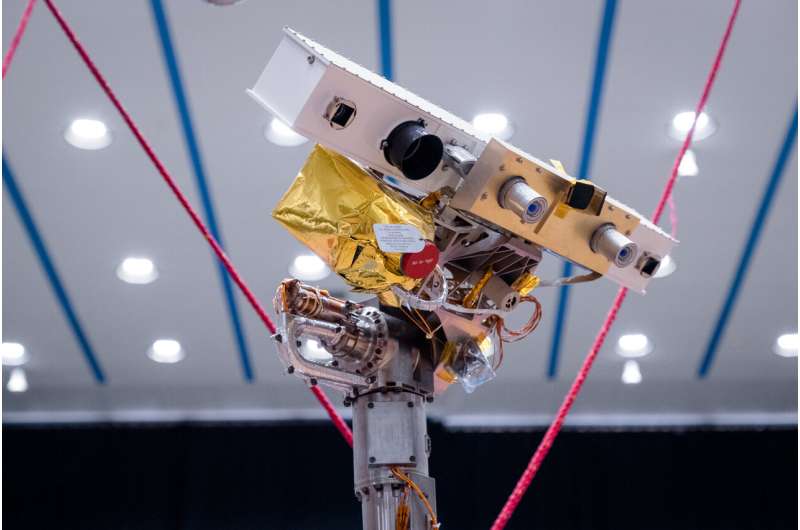
ESA’s ExoMars rover is confirmed technically ready for launch, and a fast-track study is under way to determine options for bringing the mission to Mars.
The ESA-led Rosalind Franklin rover has a unique potential to search for evidence of past life on Mars thanks to its drill and laboratory. It will be the first rover to drill 2 m below the surface, and the first to use novel driving techniques, including wheel-walking, to overcome obstacles.
Although the 2022 launch window for the mission is no longer possible following the suspension of cooperation with Roscosmos, the mission’s System Qualification and Flight Acceptance Review took place as planned in March. The Review Board confirmed that the spacecraft would have been ready for the timely shipment to the launch site and the program had a sufficient time margin for the original launch opportunity opening on 20 September 2022.
Due to the suspension of the 2022 launch, the Exomars elements are now being prepared for storage at a Thales Alenia Space site in Italy awaiting further instruction.
The Review Board members specifically expressed their appreciation and thanks to the review team for the exhaustive work performed over the past months.
Based on the decision by ESA Member States at its March Council meeting, a fast-track industrial study will now start to better define the available options for a way forward to implement the ExoMars rover mission in a future launch.
The teams will be looking for the earliest possible launch depending on how quickly technologies can be developed to support a European-led mission, or in collaboration with other international partners, and the availability of compatible launchers and launch site.
“I hope that our Member States will decide that this is not the end of ExoMars, but rather a rebirth of the mission, perhaps serving as a trigger to develop more European autonomy,” says David Parker, Director of Human and Robotic Exploration at ESA.
“We count on brilliant teams and expertise across Europe and with international partners to reshape and rebuild the mission. The team is dedicated and focused on setting out the next steps to ensure we bring this incredible rover to Mars to complete the job it was designed for.”
Meanwhile, the ExoMars Trace Gas Orbiter (TGO) continues to relay the majority of data from Mars, from NASA’s Curiosity and Perseverance rovers as well as its Insight lander. TGO has considerable fuel onboard meaning it could also support data relay from the ExoMars rover in the future as well the Mars Sample Return campaign.
Explore further
Rover ready: Next steps for ExoMars (2022, March 29)
retrieved 1 April 2022
from https://phys.org/news/2022-03-rover-ready-exomars.html
part may be reproduced without the written permission. The content is provided for information purposes only.